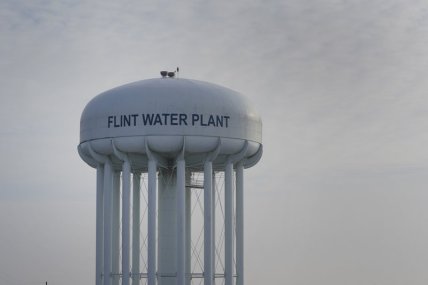EPA’s Michael Regan is fighting for environmental justice, but Flint crisis looms as cautionary tale
EXCLUSIVE: The Environmental Protection Agency's first Black man to serve as administrator attempts to deliver on promise of a lead-free America. Former Flint Mayor Karen Weaver has a message for the powers that be.
While political pundits read the tea leaves to predict who will be the first Black woman nominated to the U.S. Supreme Court by President Joe Biden, another historic Biden pick, Environmental Protection Agency Administrator Michael S. Regan, is raising expectations among agency staff and advocates across the country in his attempt to deliver on the promise of a lead-free America.
All the while, local leaders in Flint, Michigan hope to someday become a blueprint for environmental justice – not just a cautionary tale.

“It’s not lost on this agency and these employees that we’re making history,” Administrator Regan told theGrio. “I’m the first Black man ever to lead this agency. I’m the first person to graduate from a historically Black college leading this agency. I have a different perspective than all of the leaders that have come before me and I think that my staff has embraced that it’s a breath of fresh air. The staff here are passionate about the environment and public health.”
The EPA administrator went on to say, “They joined public service because they want to make a difference. And they recognize that just like the judicial system, just like policing, just like education there are injustices in the environmental arena as well and they want to right many of those wrongs and they’re looking for a strong leader to help them figure it out. And that’s exactly what I’m doing.”
In an effort to right a wrong, most notably in places like Flint, where a 2014 water contamination of lead became a national headline, federal funding from President Biden’s Infrastructure Investment and Jobs Act are being deployed to deliver a lead-free future to the next generation.
“We released the Biden-Harris Lead Pipe and Paint Action Plan,” said Vice President Kamala Harris, during remarks in Milwaukee on the Bipartisan Infrastructure Law last month. “The goal is to remove and replace all lead pipes over the next 10 years. It will invest $15 billion nationally in this effort. And here in Wisconsin, as has been said, $48 million will be dedicated in the year 2022.”
To put a finer point on the fierce urgency of this investment, Rep. Gwen Moore (D-WI, 4th District) told theGrio about its potential impact on the lives of children and families in her home state.

“Our lead crisis is an epidemic of inequity, disproportionately impacting children of color in Milwaukee and throughout our nation. There is no safe level of lead in children. Every child exposed to this poison is a tragedy for our community,” said Congresswoman Moore.
“That exposure has lifelong consequences and creates an immeasurable cost to our society. I don’t want another generation of kids in Milwaukee to grow up with lead in their water or their homes.”
Vice President Harris also appeared to be optimistic about the potential for this initiative to make a material difference in the lives of children and adults across the country.
“Our children are going to school where they are potentially drinking lead-infused, poisonous water out of water fountains,” she said. “It means that our children are sleeping in bedrooms that are coated with lead paint…[and] at least half of children under the age of six in America are exposed to lead or are at risk. This is a profound issue.”
Vice President Harris went on to say, “And as for adults, exposure to lead can result in increased blood pressure and a decreased kidney function. In our children, irreparable damage to the body and the brain.”

While the bipartisan infrastructure law roadshow featuring EPA Administrator Reagan continues, he acknowledged that the learning tour on a range of issues under his purview has been a constant source of insights and inspirations since his confirmation.
“I’ve spent time with 50 mayors in the last ten months. I’ve visited over 18 states. I’ve been to three countries outside of the United States. I’ve learned a heck of a lot because I’m talking to real people about real problems,” Administrator Regan told theGrio. “I bring that back and immediately infuse that into policy and regulations, so that our agency has more of an impact.”
But there is perhaps no greater opportunity for impact than restoring the faith of Flint residents than by turning the continuing Flint Water Crisis into the Flint Environmental Justice Blueprint. This may be the litmus test by which the Biden-Harris Administration’s Build Back Better framework agenda is fairly judged given the historic first at the EPA and historic infrastructure investment.
“No city should ever have to deal with the conditions that Flint dealt with in terms of lead service lines. Right now Ben Harbor, Michigan is facing some similar issues,” said the administrator.
Underscoring some of the challenges made more visible by Flint, Regan said, ”I was visiting Jackson, Mississippi during the Journey to Justice Tour. I was supposed to spend time with some children at an elementary school but that visit was canceled 30 minutes in because the water pressure to that school was too low for the children to occupy that building.
He added, “I had just toured a wastewater treatment facility and by the time I left, they had to shut it down partially and had to submit a boil water advisory because the water wasn’t fit to drink. The Mayor of Jackson Mississippi and I both know that’s unacceptable.”
While some Flint residents are still waiting to be made whole by the Environmental Protection Agency, this acknowledgement by the EPA administrator is welcomed but actions speak louder than words, according to some local advocates.
“We’ve been protesting about this settlement that we know is unfair and unjust. Flint was lied to by people that we were supposed to be able to trust and that were supposed to have our backs. There are good reasons why we don’t trust,” said Former Flint Mayor Karen Weaver.

The former mayor confirmed exclusively with theGrio that she’s actively considering another run for mayor to finish what she started.
“When I left office we were a year ahead in the pipe replacement program. The pipes program replacement program has not been completed. There’s still people who haven’t gotten those new pipes,” said Weaver.
She explained why the work of replacing the lead contaminated infrastructure in Flint is unfinished.
“Even if you got those new pipes in front of your house, our in-home plumbing was damaged. Faucets, fixtures, appliances and those kinds of things are damaged. So when you’ve got old appliances and fixtures and you have water coming through that, you still don’t have access to clean water,” said Weaver.
“This is something that should happen at no cost to the people because the people didn’t create this situation. We didn’t create this problem. This problem was put upon us by the government.”
In November 2021, a federal judge approved a partial settlement of $626.25 million to compensate as many as 85,000 residents for the problems caused by the water crisis.
But even with the money headed toward Flint residents, the health and safety issues related to the water crisis persist in the majority-Black community. Many residents exposed to lead in their tap water developed illness like Legionnaires’ disease, miscarriages, behavioral problems in children and male infertility.
“I never thought I’d know so much about water and water quality standards. I never thought I’d know so much about infrastructure, pipes, and what you need to do when a community has been emotionally and mentally traumatized,” added Weaver.

“We need health care for people that follows them. If they leave Michigan they should still have healthcare because they were impacted. This crisis was done to us. We didn’t create this crisis. This was a failure of government and the federal government played a role and they ought to have a role in helping to make the people of Flint whole.”
As NBC News reported, 80% of the settlement funds will be distributed to Flint residents who were 6 or younger at the time of initial exposure of the lead contaminated water. Two percent of the funds will be distributed to special education services in Genesee County, which encompasses Flint, 18% will fund property damage and 1% will go toward businesses who suffered financial deprivation due to the water crisis.
Still, in what feels like a David and Goliath battle to repair the breach in trust and downgrade in humanity, Former Mayor Weaver said she remains hopeful.
“What gives me hope is that with all of these bad things happening around the country, the spotlight has been shined on social justice. It has been shining on what environmental justice looks like and environmental racism,” said Weaver.
“I don’t know if there’s ever been a bigger spotlight on the thing that Black people have had challenges with and I think this is such a wonderful opportunity to make some things happen. This money is coming through and it’s an opportunity for the playing field to be leveled. We don’t want equality, we want equity.”
Meanwhile, EPA Administrator Regan has placed some big bets that should make a difference addressing some of the most glaring challenges in places like Milwaukee, Flint, and Jackson, while institutionalizing a commitment to centering racial equity in the existing and emerging work of the EPA.

“We are going to develop a robust Environmental Justice and Equity Office. We’ve always done environmental justice work within a sub-office, now we are working towards establishing an office equal to all that focuses specifically on civil rights and environmental justice, to be sure that it’s infused in every single thing that we do,” said Regan.
“For the first time in history we’re going to have, hopefully if we get Congressional approval, someone who is Senate-confirmed leading that office with a healthy budget and healthy oversight. That’s going to be a game-changer for EPA in years two and three.”
The Administrator went on to say, “Over the next year, you’re going to see an infusion of capital in cities all across this country with these historic investments that are not only going to begin to repair our broken water systems and replace lead service lines, but you’re going to see a heck of a lot of Black and Brown people go to work. We need to see these jobs in our communities correlating with these environmental benefits that we’ve been touting.”
Between Weaver and Regan, the bar has been set high but the stakes for Black America couldn’t be higher. If the Biden-Harris Administration succeeds, they would be carving out an enviable legacy that historic firsts before them have been unable to fully deliver on to the people of Flint.
TheGrio is now on your TV via Apple TV, Amazon Fire, Roku, and Android TV. Also, please download theGrio mobile apps today!”


